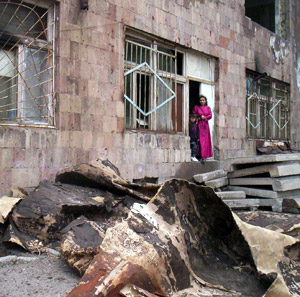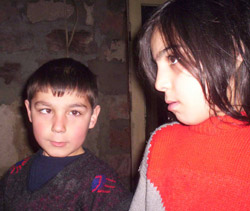There are no homes in the 4th alley of Artsakh; just some factories that have either gone bankrupt or have stayed there since the collapse of the Soviet Union. Next to the chemical/radioactive and flouring mill factories, where there is no sign of life anywhere, there is one half-destructed building, which used to some school.
“168 hours” visited that alley and as soon as we approached the building, a small boy popped out of nowhere and greeted us by saying: “Did you know that I wear white shoes? Wait a minute.” I wait…He barely makes his way inside the house amongst all the trash piled up in the front entrance. He comes out with one shoe and the other in his hand.
“See, it’s white. I walk carefully so as not to make them dirty. I have to go to school with these shoes. I have to walk carefully. Today, my mom and dad slept in and I didn’t go to school.”
Serobik is 9 years old and lives in a half-destructed building. There are no stairs for Serob to climb to his house, instead he has to make his way from one rock to the other. It is very hard road and he even fell once. Due to the large bruise on his head, his eyes became cross-eyed. The parents took Serob to a doctor, but when the doctor said that they had to pay 200 dollars for an operation, Serob’s parents lost all hope of ever curing their son. They believe that God will help them. Serob goes to school like that. Serob’s parents, Armen and Paytsar, say that although they do everything they can for their four children, however, they don’t make ends meet. They can’t even adapt to the changing weather. Every summer they plan on buying warm clothes for the children, but when winter swings by, they realize that it’s too late and the children freeze. The same goes for studies. One of their children, Alina, is eight years old and Serob is nine, but both of them have just started to go to school. They are both in the first grade. Neighbors say that the children didn’t have clothes to go to school. Currently, they study at the No.5 night school and come home only on Saturdays and Sundays. The children are not too pleased with their daily routines.
“We learn our lessons, then go to the playroom, watch cartoons, then we go to the bedroom, sleep and then go to the buffet to eat. We do the same thing everyday, over and over again…”says Alina. Alina and Serob miss their cold and small home. Alina stands in front of her mother and recites the following in a sad tone in order to show how much she misses home:
“I know that all mothers are kind, but there is one and only one other for me in this world…”
She stands there, hoping that that will make her mother react and let her stay home longer. Serob comes to his mother with a jealous look on his face and says:
“Alina didn’t make that up, they taught her that in school. Do you want me to say it too?”
Armen says to Alina to make her calm down.
“Here’s my queen, the queen of my house.” Looking at his wife, he says: “Paytsar is my friend.”
When Serob talks with people, he doesn’t look at them straight in the eye. He is probably afraid that they will notice that he’s cross-eyed.
 The house doesn’t belong to the family. Armen has appealed to the Shengavit quarter-municipality many times, asking them to at least give them one room of the building, but he still hasn’t received a reply. The family is hanging from thin air and don’t know what’s next. Armen says:
The house doesn’t belong to the family. Armen has appealed to the Shengavit quarter-municipality many times, asking them to at least give them one room of the building, but he still hasn’t received a reply. The family is hanging from thin air and don’t know what’s next. Armen says:
“Years ago, we found ourselves out on the streets and didn’t have anywhere to go. We came here by chance, saw that the building was empty and moved in. There was trash everywhere; we spent the first couple of days just cleaning the house. We moved in this building and have been living here for the past three years. There isn’t any water or bathroom in the building. If we had gotten permission from the quarter-municipality, then maybe we would have thought of something for the water. It’s kind of hard when you have four kids and no bathroom.”
Armen works as a patrol officer for 65 dollars and the family gets a 55 dollar subsidy. Artash, who is Armen and Paytsar’s three-year old child, was sleeping on the floor in his winter clothes. In contrast to his brother and sister, he doesn’t quite understand many things and doesn’t miss his parents. He has only one demand-to eat well, but that is one big issue for the parents. Whereas Alina and Serob get food to eat at the night school, Artash starves sometimes. Although Serob and Alina miss home, however, they have no alternative. Armen and Paytsar say that their children must go to the night school or else they will starve.

